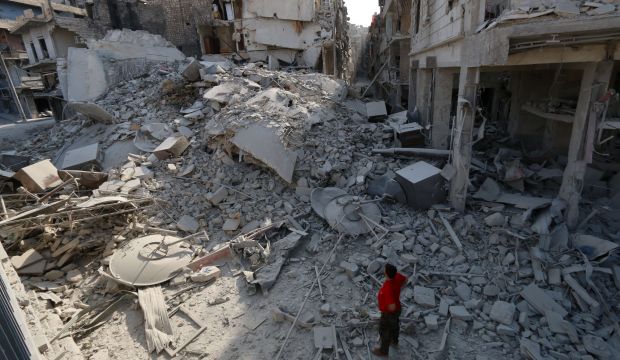During my most recent visit to Turkey, Pope Francis described the actions being taken by the Islamic State of Iraq and Syria (ISIS) as a “profoundly grave sin against God.” He said he could not resign himself to a “Middle East without Christians,” who had been free to worship in the region for 2,000 years. These comments came during a joint meeting with the leader of the Orthodox Church, Patriarch Bartholomew, in Ankara.
I was among the first writers to warn against compromising the presence of Christians in the Middle East and I have written a number of op-eds on this issue looking at the situation of Christians in Syria, Iraq, and elsewhere. However, the fear today should not be of a Middle East “without Christians” but a Middle East without intellectuals and writers to speak out against the repression and intimidation that we are seeing in Iraq, Syria, Yemen and Libya. If our Arab intellectuals and writers are expelled or forced to leave our region, this is something that will also affect Christians and other minorities in the region, and would represent a true tragedy.
We must also not forget that ISIS has targeted Sunnis in Iraq and Syria. While the Sunni community was also the most targeted by the sectarian policies of the Shi’ite Nuri Al-Maliki government in Iraq, backed by Tehran. Maliki even targeted Shi’ite and Christian intellectuals. Sunnis killed by the Bashar Al-Assad government in Syria outnumber the members of other minorities targeted by this regime, whether we are talking about Alawites or Christians. Assad also subjected intellectuals of all stripes to intimidation tactics and repression for speaking out against his regime.
We can also look at Lebanon’s Hezbollah, also backed by Iran, which is targeting Sunni, Shi’ite and Christian intellectuals and writers alike. More than this, we can see the extent of the incitement and provocation being practiced by the state of Turkey in defense of the Muslim Brotherhood and other Islamist groups, whether in Egypt or elsewhere. Pope Francis hailed Turkey as a “bridge” between the East and the West that is playing a “model” role in encouraging inter-cultural dialogue, but Ankara’s real role is, in reality, the complete opposite of this.
Therefore, the fear today is not of a Middle East without Christians, but a Middle East without intellectuals and writers, who will flee from an atmosphere of intimidation and accusations of betrayal and treachery being thrown around. This, in turn, will deprive future generations, whether Muslims—Sunni or Shi’ite—or Christians or members of other minorities.
Let me also say that Iran’s actions in our region, facilitated by the international community, are also inciting sectarianism and legitimizing the conflict that is currently raging here. This is not to mention Turkey’s desperate defense of the Muslim Brotherhood and other Islamists, which represents a threat today to Turkey itself and, to a lesser extent, Egypt.
All of this raises fears and anxieties regarding the future of the region, and we need regional and international effort to correct the path that our region is taking, otherwise the entire Middle East will be a theater of violence, exclusion and madness. This, in turn, is not just a threat to the region, but to the entire international community.
